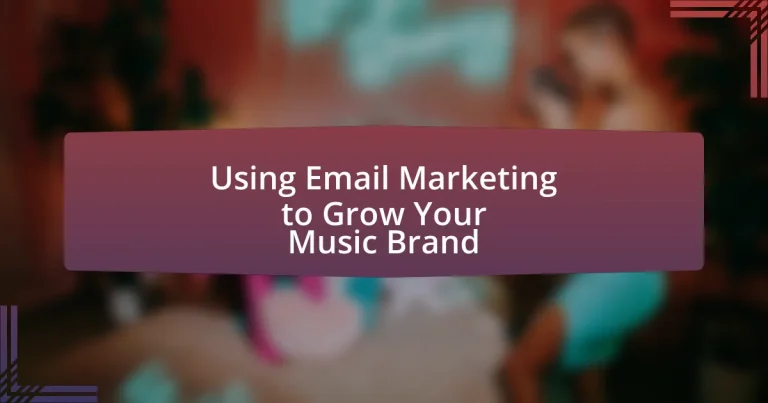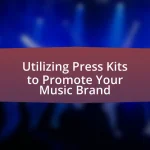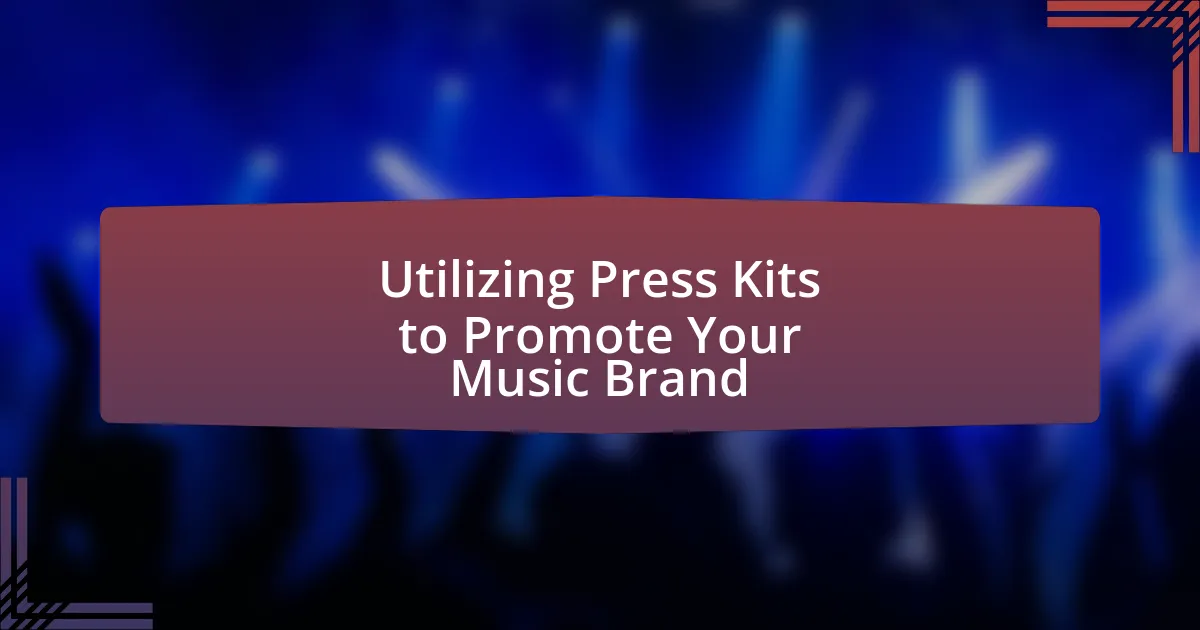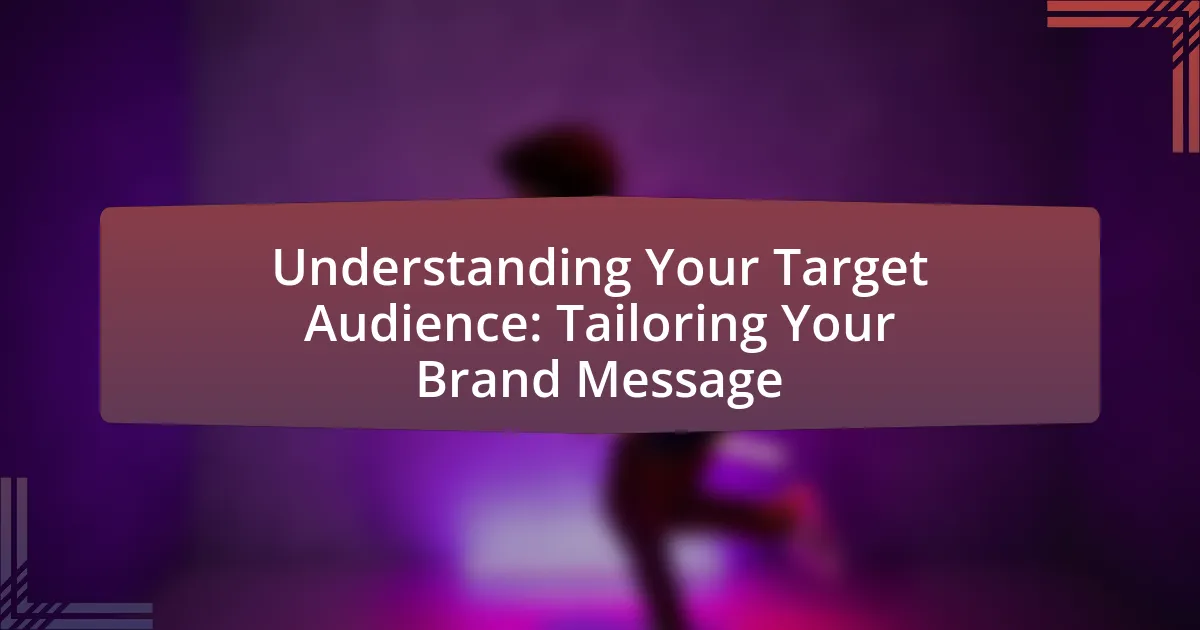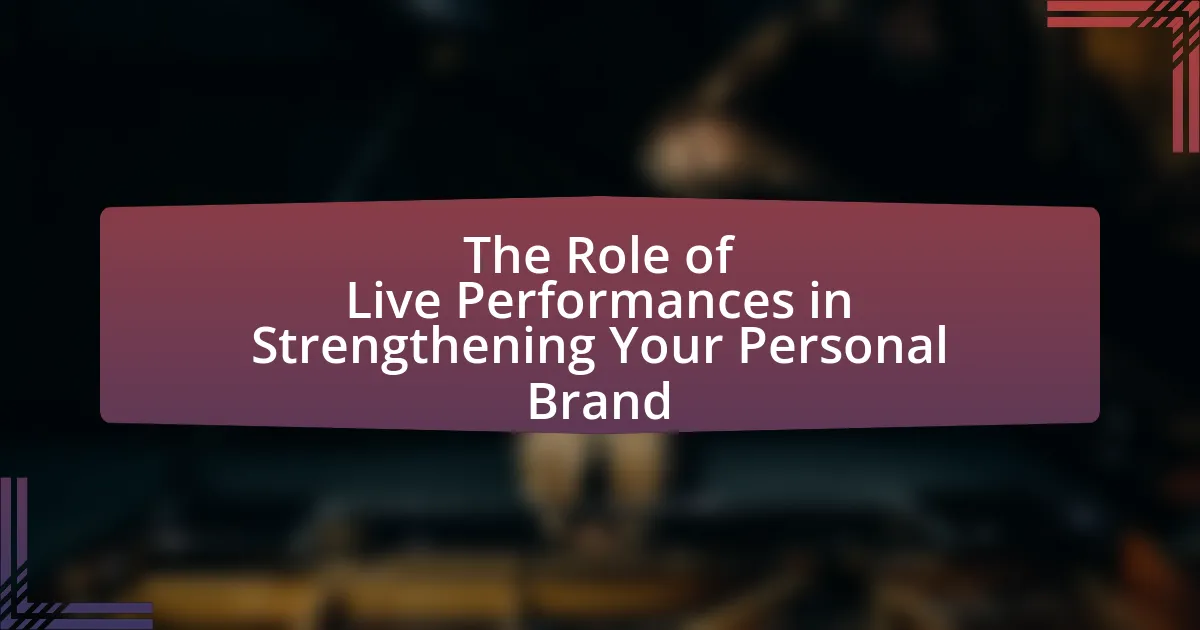Email marketing is a digital strategy that allows music brands to engage directly with their audience through targeted email communications. This article explores how musicians can leverage email marketing to enhance fan engagement, drive ticket sales, and increase merchandise revenue. Key components of an effective email marketing strategy include building a targeted email list, creating engaging content, segmenting the audience, and analyzing performance metrics. Additionally, the article discusses the advantages of email marketing over other channels, strategies for growing subscriber lists, and best practices for compliance and effectiveness in the music industry.
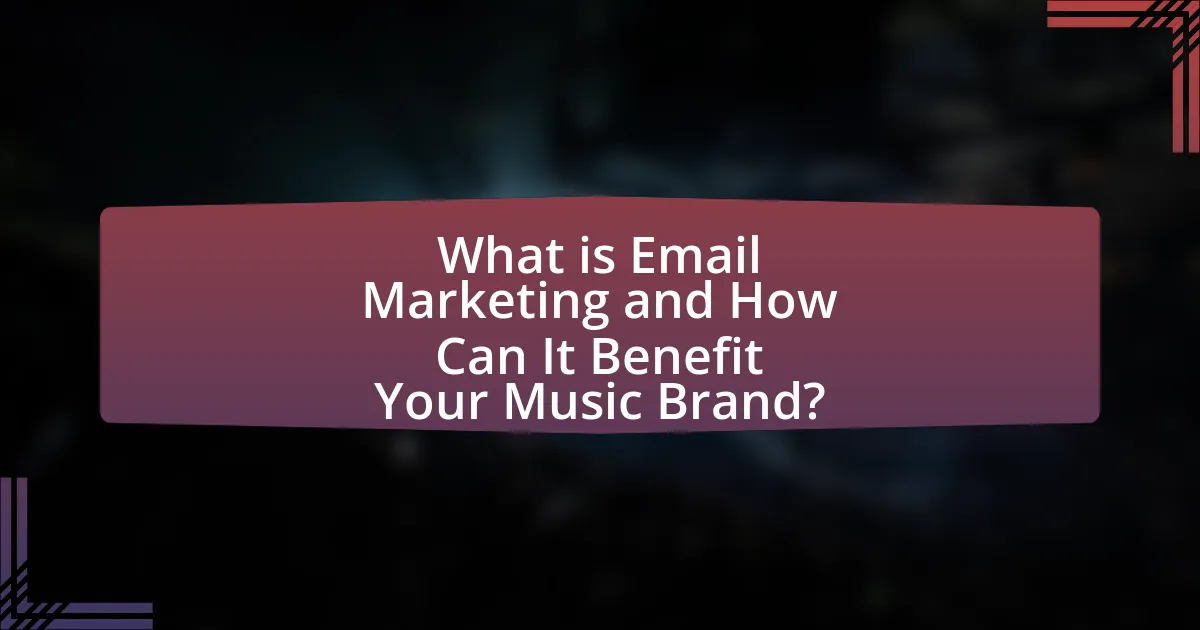
What is Email Marketing and How Can It Benefit Your Music Brand?
Email marketing is a digital marketing strategy that involves sending targeted emails to a list of subscribers to promote products, services, or content. For a music brand, email marketing can significantly enhance audience engagement, drive ticket sales, and increase merchandise revenue. According to a study by the Direct Marketing Association, email marketing has an average return on investment of $42 for every dollar spent, making it a cost-effective tool for reaching fans and building a loyal community. By utilizing email marketing, music brands can share exclusive content, announce new releases, and foster direct communication with their audience, ultimately leading to increased brand loyalty and sales.
How does email marketing work in the context of music branding?
Email marketing works in the context of music branding by enabling artists and labels to communicate directly with their audience, fostering engagement and loyalty. This direct communication allows musicians to share updates, promote new releases, and offer exclusive content, which can enhance their brand identity. According to a study by the Direct Marketing Association, email marketing has an average return on investment of $42 for every dollar spent, highlighting its effectiveness in reaching and converting fans. By segmenting their email lists based on fan preferences and behaviors, artists can tailor their messages, increasing the likelihood of engagement and driving ticket sales or merchandise purchases.
What are the key components of an effective email marketing strategy for musicians?
An effective email marketing strategy for musicians includes building a targeted email list, creating engaging content, segmenting the audience, and analyzing performance metrics. Building a targeted email list involves collecting emails from fans at live shows, through social media, and on the musician’s website, ensuring that the audience is genuinely interested in the music. Engaging content should include updates on new releases, exclusive behind-the-scenes content, and personalized messages to foster a connection with fans. Segmenting the audience allows musicians to tailor messages based on fan preferences, location, or engagement level, which can significantly increase open and click-through rates. Finally, analyzing performance metrics such as open rates, click rates, and conversion rates helps musicians refine their strategies and improve future campaigns. According to a study by Mailchimp, segmented campaigns can result in a 14.31% higher open rate and a 100.95% higher click rate compared to non-segmented campaigns, demonstrating the effectiveness of these components.
How can musicians leverage email marketing to connect with their audience?
Musicians can leverage email marketing to connect with their audience by building a targeted email list and sending personalized content. By collecting email addresses through sign-ups on their website or social media, musicians can create a direct line of communication with fans. Personalized emails, such as exclusive updates, behind-the-scenes content, and special offers, enhance engagement and foster a sense of community. According to a study by Campaign Monitor, email marketing has an average ROI of 4400%, demonstrating its effectiveness in reaching and retaining audiences.
What are the advantages of using email marketing for music brands?
Email marketing offers music brands several advantages, including direct communication with fans, cost-effectiveness, and measurable results. By utilizing email marketing, music brands can engage their audience with personalized content, such as exclusive updates, concert announcements, and merchandise promotions, fostering a stronger connection. Additionally, email marketing has a high return on investment; for every dollar spent, it can generate an average of $42 in return, according to the Data & Marketing Association. This effectiveness is further supported by the ability to track open rates, click-through rates, and conversions, allowing brands to refine their strategies based on real-time data.
How does email marketing compare to other marketing channels for musicians?
Email marketing is more effective for musicians compared to other marketing channels due to its high engagement rates and direct communication with fans. Studies show that email marketing has an average open rate of 20-30%, significantly higher than social media platforms, which typically see engagement rates below 1%. Additionally, email allows musicians to build a personalized relationship with their audience, leading to increased loyalty and concert attendance. According to a report by Campaign Monitor, for every $1 spent on email marketing, the average return on investment is $42, underscoring its financial effectiveness compared to other channels like social media or paid advertising.
What specific outcomes can musicians expect from effective email marketing?
Musicians can expect increased fan engagement and higher ticket sales from effective email marketing. By regularly communicating with their audience through targeted email campaigns, musicians can foster a loyal fan base, leading to a 20% increase in concert attendance as reported by Eventbrite. Additionally, personalized email content can result in a 29% higher open rate, which directly correlates with increased merchandise sales and streaming activity. These outcomes demonstrate the tangible benefits of utilizing email marketing strategies to enhance a musician’s brand and revenue.
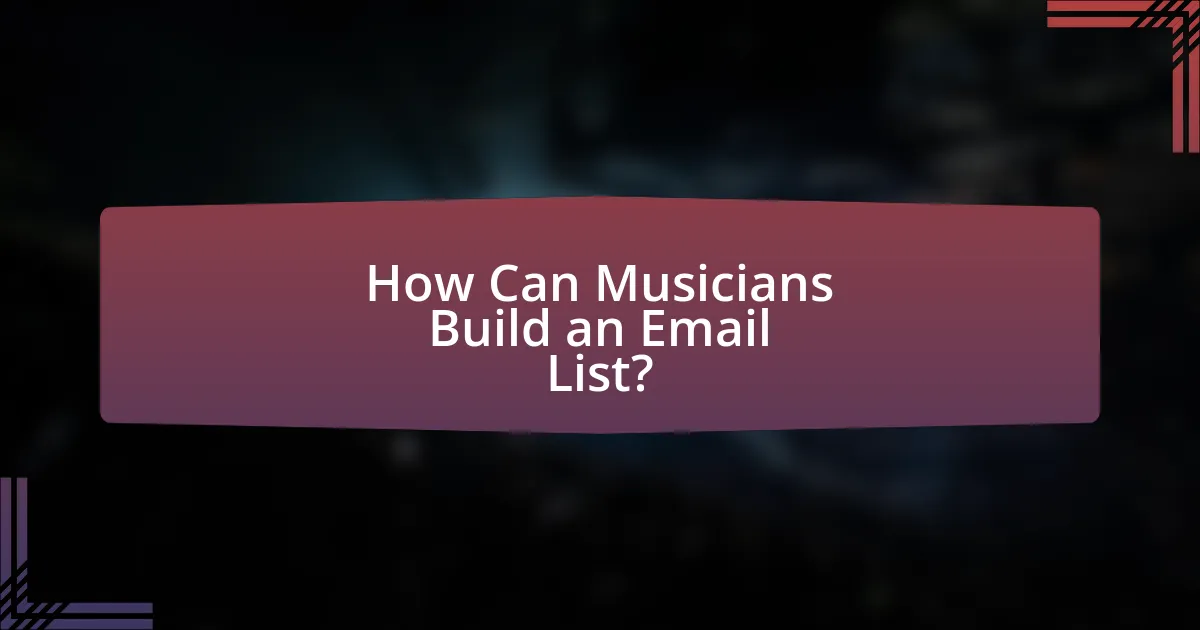
How Can Musicians Build an Email List?
Musicians can build an email list by offering incentives such as exclusive content, free downloads, or early access to tickets in exchange for email sign-ups. This strategy effectively encourages fans to subscribe, as it provides them with tangible value. According to a 2021 survey by Statista, 81% of marketers consider email newsletters to be their most effective form of content marketing, highlighting the importance of email lists in engaging audiences. Additionally, musicians can utilize social media platforms to promote their email sign-up forms, further expanding their reach and potential subscriber base.
What strategies can musicians use to grow their email subscriber list?
Musicians can grow their email subscriber list by offering exclusive content, such as free downloads, behind-the-scenes access, or early ticket sales. This strategy incentivizes fans to subscribe, as they receive valuable material that is not available to non-subscribers. For instance, a study by HubSpot found that offering a lead magnet, like a free song or exclusive video, can increase sign-up rates significantly, with some musicians reporting up to a 30% increase in subscribers after implementing such offers. Additionally, musicians can utilize social media platforms to promote their email sign-up forms, driving traffic to their subscription page and expanding their reach.
How can social media be utilized to encourage email sign-ups?
Social media can be utilized to encourage email sign-ups by promoting exclusive content and offers that are only accessible through email subscriptions. For instance, artists can share posts highlighting free downloads, early access to new music, or special merchandise discounts available exclusively to email subscribers. According to a study by HubSpot, companies that use social media to drive email sign-ups see a 20% increase in conversion rates. By integrating clear calls-to-action in social media posts, such as “Sign up for our newsletter for exclusive updates,” artists can effectively direct their audience to sign-up forms, thereby increasing their email list and enhancing engagement with their music brand.
What role do live events play in building an email list for musicians?
Live events are crucial for musicians in building an email list as they provide direct interaction with fans, facilitating personal connections that encourage sign-ups. During these events, musicians can promote their email lists through merchandise sales, exclusive content offers, or sign-up sheets, effectively capturing the interest of attendees. For instance, a study by Eventbrite found that 70% of attendees are likely to share their email addresses with artists they enjoy, highlighting the effectiveness of live events in expanding a musician’s audience.
What tools and platforms are available for managing email marketing?
Several tools and platforms are available for managing email marketing, including Mailchimp, Constant Contact, and SendinBlue. Mailchimp offers user-friendly templates and automation features, making it suitable for beginners and experienced marketers alike. Constant Contact provides robust analytics and social media integration, enhancing campaign effectiveness. SendinBlue stands out with its SMS marketing capabilities alongside email services, catering to diverse marketing needs. These platforms collectively support various aspects of email marketing, such as list management, campaign tracking, and performance analysis, which are essential for growing a music brand.
Which email marketing services are best suited for musicians?
Mailchimp, ConvertKit, and Sendinblue are the best email marketing services suited for musicians. Mailchimp offers user-friendly templates and automation features, making it easy for musicians to create visually appealing campaigns. ConvertKit specializes in audience segmentation and landing page creation, which helps musicians effectively target their fanbase. Sendinblue provides SMS marketing capabilities alongside email, allowing musicians to reach their audience through multiple channels. These services are tailored to meet the unique needs of musicians, enhancing their ability to engage with fans and promote their music effectively.
How can musicians effectively use automation in their email campaigns?
Musicians can effectively use automation in their email campaigns by implementing targeted email sequences that engage fans based on their behavior and preferences. For instance, musicians can set up automated welcome emails for new subscribers, ensuring they receive a warm introduction and relevant content, such as links to music or upcoming shows. Additionally, automation allows for personalized follow-ups after concerts or album releases, enhancing fan interaction and retention. According to a study by Mailchimp, automated emails have an open rate of 50% higher than regular emails, demonstrating their effectiveness in maintaining audience engagement. By leveraging automation tools, musicians can streamline their communication, ensuring timely and relevant messages that resonate with their audience.
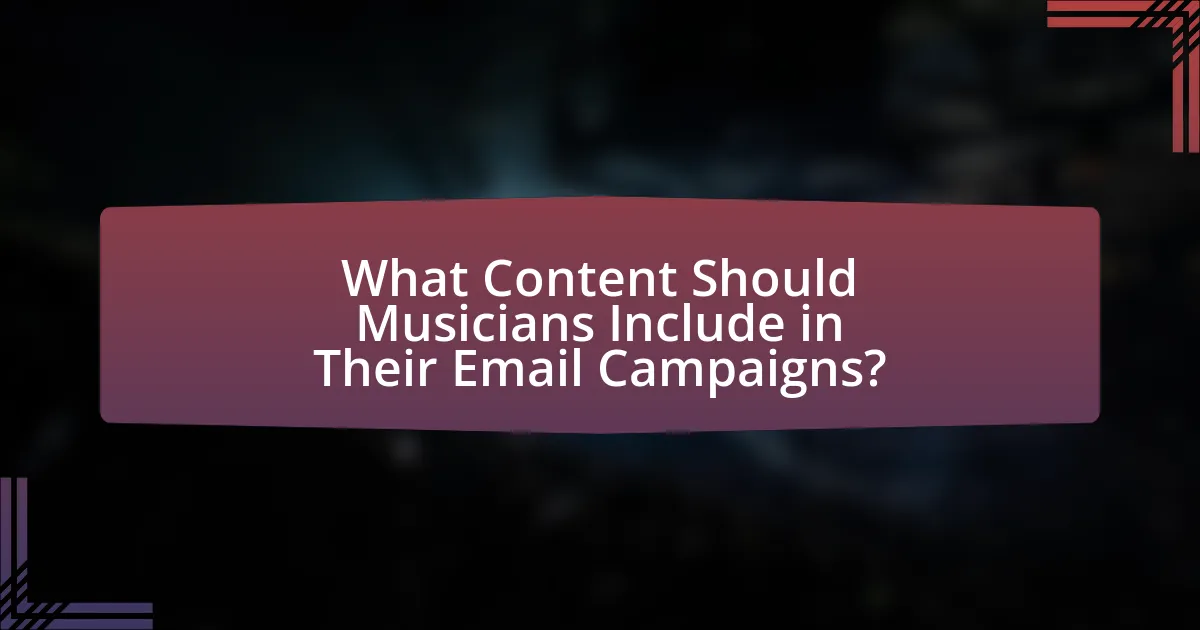
What Content Should Musicians Include in Their Email Campaigns?
Musicians should include a mix of engaging content in their email campaigns, such as updates on new music releases, concert announcements, exclusive behind-the-scenes content, and personalized messages to fans. This approach keeps the audience informed and fosters a deeper connection. For instance, according to a study by Mailchimp, emails that include personalized content can see a 26% increase in open rates, demonstrating the effectiveness of tailored communication. Additionally, including links to streaming platforms and social media can drive traffic and engagement, further enhancing the musician’s brand presence.
What types of content resonate most with music fans in email marketing?
Engaging content types that resonate most with music fans in email marketing include exclusive music releases, concert announcements, and personalized playlists. Exclusive music releases create a sense of urgency and excitement, as fans often seek early access to new tracks. Concert announcements inform fans about upcoming shows, fostering a connection between the artist and their audience. Personalized playlists cater to individual tastes, enhancing the listener’s experience and encouraging interaction. According to a study by Mailchimp, emails with personalized content can lead to a 26% increase in revenue, demonstrating the effectiveness of tailored communication in engaging music fans.
How can musicians create engaging newsletters that keep fans interested?
Musicians can create engaging newsletters that keep fans interested by incorporating personalized content, exclusive updates, and interactive elements. Personalization, such as addressing fans by name and tailoring content based on their preferences, increases engagement rates; studies show that personalized emails can lead to a 29% higher open rate. Exclusive updates, including sneak peeks of new music, behind-the-scenes content, or early access to tickets, foster a sense of belonging and loyalty among fans. Additionally, interactive elements like polls, quizzes, or calls to action encourage fan participation, making the newsletter more dynamic and engaging. These strategies collectively enhance the overall fan experience and maintain interest in the musician’s brand.
What promotional strategies can be included in email campaigns?
Promotional strategies that can be included in email campaigns for growing a music brand encompass offering exclusive content, discounts on merchandise, and early access to new releases. Exclusive content, such as behind-the-scenes videos or unreleased tracks, incentivizes subscribers to engage with the brand. Discounts on merchandise can drive sales and reward loyal fans, while early access to new releases creates a sense of urgency and exclusivity. According to a study by Campaign Monitor, personalized emails can generate six times higher transaction rates, demonstrating the effectiveness of tailored promotional strategies in email marketing.
How can musicians measure the success of their email marketing efforts?
Musicians can measure the success of their email marketing efforts by analyzing key performance indicators (KPIs) such as open rates, click-through rates (CTR), conversion rates, and subscriber growth. Open rates indicate how many recipients opened the email, reflecting the effectiveness of the subject line and timing. Click-through rates show the percentage of recipients who clicked on links within the email, demonstrating engagement and interest in the content. Conversion rates measure the percentage of recipients who completed a desired action, such as purchasing tickets or merchandise, indicating the overall effectiveness of the campaign. Additionally, tracking subscriber growth helps assess the impact of email marketing on expanding the audience. According to a 2021 report by Mailchimp, the average open rate for the music industry is around 20.5%, and the average click-through rate is approximately 2.6%, providing benchmarks for musicians to evaluate their performance against industry standards.
What key performance indicators should musicians track in their email campaigns?
Musicians should track open rates, click-through rates, conversion rates, and unsubscribe rates in their email campaigns. Open rates indicate the percentage of recipients who opened the email, providing insight into subject line effectiveness and audience engagement. Click-through rates measure the percentage of recipients who clicked on links within the email, reflecting the content’s relevance and appeal. Conversion rates show the percentage of recipients who completed a desired action, such as purchasing a ticket or merchandise, demonstrating the campaign’s overall effectiveness. Unsubscribe rates reveal how many recipients opted out, helping musicians assess content satisfaction and audience retention. Tracking these key performance indicators allows musicians to refine their strategies and enhance their email marketing efforts.
How can feedback from email campaigns inform future marketing strategies?
Feedback from email campaigns can significantly inform future marketing strategies by providing insights into audience preferences and engagement levels. Analyzing metrics such as open rates, click-through rates, and conversion rates allows marketers to identify which content resonates most with their audience. For instance, a study by Mailchimp found that segmented email campaigns can lead to a 14.31% higher open rate compared to non-segmented campaigns, indicating the importance of targeted messaging. Additionally, feedback from A/B testing different subject lines or content formats can guide marketers in optimizing future emails for better performance. This data-driven approach ensures that marketing strategies are continually refined based on actual consumer behavior, leading to more effective campaigns.
What are some best practices for effective email marketing in the music industry?
Effective email marketing in the music industry involves building a targeted email list, crafting engaging content, and analyzing performance metrics. Building a targeted email list ensures that communications reach individuals genuinely interested in the artist or music, which can lead to higher engagement rates. Engaging content, such as exclusive updates, behind-the-scenes insights, and personalized messages, keeps subscribers interested and encourages them to take action, such as attending concerts or purchasing merchandise. Analyzing performance metrics, including open rates and click-through rates, allows artists and marketers to refine their strategies based on what resonates with their audience, leading to improved campaign effectiveness. According to a study by Mailchimp, the average open rate for the music industry is around 23%, highlighting the importance of effective email strategies to capture audience attention.
How can musicians ensure compliance with email marketing regulations?
Musicians can ensure compliance with email marketing regulations by obtaining explicit consent from recipients before sending marketing emails. This involves using double opt-in methods, where users confirm their subscription through a follow-up email, thereby adhering to regulations such as the CAN-SPAM Act in the United States and the GDPR in Europe. Additionally, musicians must provide clear opt-out options in every email, maintain accurate records of consent, and ensure that their email content is truthful and not misleading. Compliance is further supported by regularly reviewing and updating their email marketing practices to align with evolving regulations.
What common mistakes should musicians avoid in their email marketing efforts?
Musicians should avoid sending generic emails, as personalization significantly increases engagement rates. Research shows that personalized emails can lead to a 29% higher open rate and a 41% higher click-through rate compared to non-personalized emails. Additionally, musicians often make the mistake of neglecting their email list segmentation, which can result in irrelevant content being sent to subscribers. According to a study by Mailchimp, segmented campaigns can lead to a 14.31% higher open rate. Another common error is failing to include a clear call-to-action, which can confuse recipients and reduce conversion rates. Lastly, musicians should avoid infrequent communication; sending emails too rarely can lead to decreased audience interest and engagement. Regularly scheduled emails help maintain a connection with fans and keep them informed about new releases and events.
